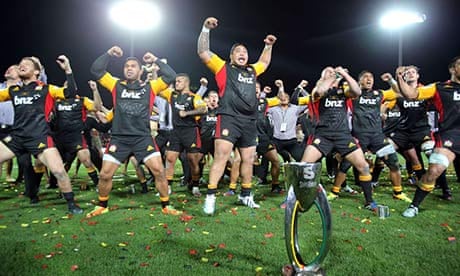Super Rugby is seriously considering splitting the current three-conference system into two from 2016 and adding two teams from Argentina.
Under a possible Super 18 model which appears the most logical future competition, Australian and New Zealand sides would join together in their own conference while South Africa would combine with Argentina.
Leading officials also say there's the possibility of Japanese teams being added in three years' time, but there's plenty of work to be done.
One thing's for certain: Super Rugby expansion will occur after the 2015 World Cup with governing body Sanzar committed to ensuring the recently-relegated Southern Kings will be one of six South African teams.
While Sanzar, which aims to finalise its next model by the end of the year, has a lot to consider before deciding upon its preferred model, the three-conference system looks to be coming towards an end.
Sanzar chief executive Greg Peters said the time-frame for the competition - currently played over 21 weeks, including three weeks for play-offs - could not be extended.
That makes it virtually impossible to keep the current structure if new teams are added as all three national unions want their local derby matches to played at home and away.
With the rigours of travel to and from South Africa combining to make player welfare a bigger issue, the simplest solution is for a two-conference split.
That would see the five Australian teams play each other twice and the five Kiwi sides once for 13 matches before both conferences came together in a six or eight-team finals series.
ARU boss Bill Pulver, who is also on Sanzar's executive committee, said the ARU hadn't decided on its preferred model but stressed the five Australian teams would remain.
"We're trying to keep a very open mind to what this structure looks like," he said in Sydney.
It's more likely two new Argentinian teams, rather than one, would be added to what would become an eight-team South African/American conference.
It would allow all teams to play home and away over 14 rounds.
The heavy political pressure for South Africa to have six teams only intensified with the Port Elizabeth-based Kings losing a tightly-fought two-match relegation play-off with the Johannesburg-based Lions last weekend.
"We really understand the desire for that from South Africa," Peters told AAP. "The Kings have 32 per cent of the playing population and 72% of that is coloured," Peters said.
"We understand the need for six teams in South Africa."
While there's massive commercial benefits with the inclusion of Japan before it hosts the 2019 World Cup, there's logistical problems in fitting them into the Australasian conference.
Sanzar and the ARU are both pushing for the June international window to be moved to July to ensure Super Rugby can be played in one complete block instead of being interrupted for Test matches before the play-offs.

Comments (…)
Sign in or create your Guardian account to join the discussion